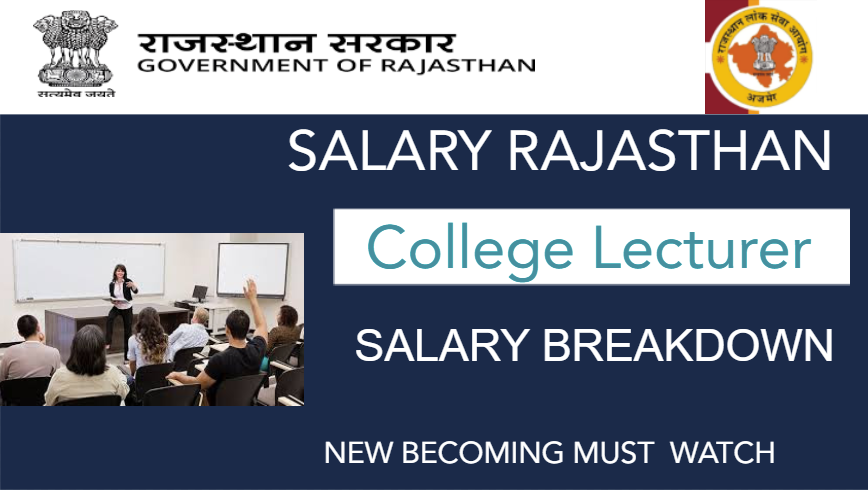The academic world offers a rewarding career path, and the role of a college lecturer plays a pivotal role in shaping young minds. If you’re considering a career as a lecturer in Rajasthan, understanding the salary structure is crucial. This comprehensive guide explores the factors influencing lecturer salaries in Rajasthan for the academic year 2024-25.

Understanding Salary Structure:
A college lecturer’s salary in Rajasthan comprises various components. Here’s a breakdown:
- Basic Pay: This forms the foundation of your salary and is determined by your pay scale level. The Seventh Central Pay Commission (CPC) dictates pay scales for government colleges, while universities may have their own pay structures.
- Academic Grade Pay (AGP): This component recognizes your academic qualifications and experience.
- Dearness Allowance (DA): This allowance helps adjust for inflation and is a variable component linked to the Consumer Price Index (CPI).
- House Rent Allowance (HRA): This allowance varies depending on the city/town where your college is located and helps with housing expenses.
Government vs. Private Colleges:
Salary structures differ between government and private colleges in Rajasthan.
- Government Colleges: Here, salaries follow the pay scales set by the UGC (University Grants Commission) based on the 7th CPC. These salaries are generally higher and offer greater job security.
- Private Colleges: Private colleges have more flexibility in determining salaries. They may offer packages similar to government colleges or slightly lower, but may compensate with additional benefits like bonuses or health insurance.
Lecturer Designation and Salary Range (Indicative):
| Designation | Pay Scale | Basic Pay Range (₹) | Academic Grade Pay (₹) | Estimated Salary Range (₹) |
|---|---|---|---|---|
| Assistant Professor | Pay Level-10 | 57,700 – 182,400 | 6,000 | 70,200 – 1,95,900 |
| Associate Professor | Pay Level-13A | 131,400 – 217,100 | 7,000 | 144,900 – 2,30,600 |
| Professor | Pay Level-14 | 144,200 – 218,200 | 8,000 | 157,700 – 2,32,700 |
Factors Affecting Salary:
Several factors influence a college lecturer’s salary in Rajasthan:
- Experience: Salaries generally increase with experience.
- Qualification: A Ph.D. typically commands a higher salary than a Master’s degree.
- Subject Specialization: In-demand subjects or those with a shortage of qualified lecturers may fetch higher salaries.
- College Reputation: Prestigious colleges often offer higher salaries to attract and retain talent.
- Location: Salaries may be higher in larger cities compared to smaller towns.
Additional Perks and Benefits:
Beyond the basic salary structure, lecturers in Rajasthan may enjoy benefits like:
- Travel Allowance (TA): This allowance helps cover travel expenses incurred for official purposes.
- Medical Insurance: Some colleges provide medical insurance coverage for employees and their dependents.
- Provident Fund: Both government and private colleges typically contribute to a provident fund scheme.
- Leave Entitlements: Lecturers are entitled to paid leave for vacations, illness, and other purposes.
Final Remarks
A career as a college lecturer in Rajasthan offers a fulfilling experience and a respectable salary. Understanding the factors influencing salaries can help you make informed decisions when negotiating your employment package. Remember, salary is just one aspect to consider. The work environment, opportunities for growth, and personal satisfaction are equally important for a long-lasting and rewarding career in academia.
FAQs
- What is the average salary of a college lecturer in Rajasthan?
The average salary can vary depending on factors like designation, experience, and college type. However, based on the pay scales mentioned, it could range from ₹70,200 to ₹2,32,700 annually.
- Do government colleges in Rajasthan pay more than private colleges?
Generally, yes. Government colleges follow the UGC pay scales, which are typically higher than those offered by private colleges.
- What are the career growth prospects for college lecturers in Rajasthan?
With experience and qualifications, lecturers can progress to higher positions like Associate Professor and Professor, which come with increased responsibilities and, of course, higher salaries.
